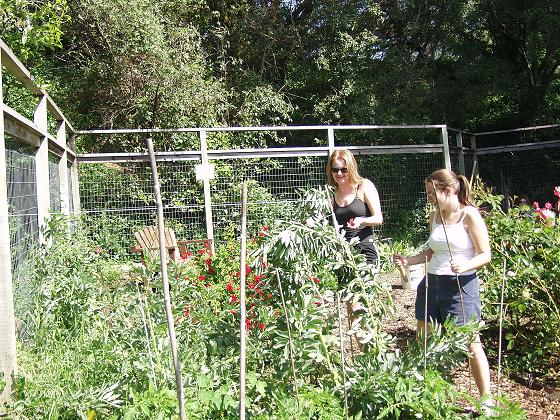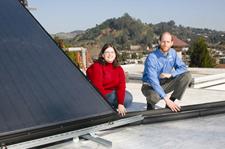| The Project Component Does Work in Environmental Ethics |
![PDF-NOTE: Internet Explorer Users, right click the PDF Icon and choose [save target as] if you are experiencing problems with clicking.](http://rsnonline.org/templates/rsntemplate-smallmasthead/images/pdf_button.png) |
 |
|
Page 1 of 3 Carol S. Robb, San Francisco Theological Seminary and the Graduate Theological Union
Herb Gardens and Solar PanelsA course I teach every spring semester, “Environmental Ethics,” consistently contains a project component to make this course one instance of theory/practice integration. The course is one of three I teach that fulfills the ethics requirement in the Master of Divinity (MDiv) curriculum, and it may be the only course in ethics these students take. One of the learning objectives is that students learn the major language and concepts of ethics, and the delivery system for achieving this objective is ecological literature. I have required a class project in this course, but in each class the students choose the project. The main guideline is that the project be an arena for the students to learn one or more new skills that prepare them to live more lightly on the earth. The propensity among this demographic is to want to teach someone else something new; however, this does not fulfill the requirement. The assignment is difficult to conceptualize at the beginning of the semester, so I allow several minutes at the beginning of several classes to gather ideas and find out what each proposer believes would be the new skill resulting from the project. It is not necessary to have only one project per class, but it is preferable. Sometimes we’ve had three or four, because not every student is residential and the skill levels can vary widely. The choosing process can take a while. That’s okay, because in the meantime we are reading three different texts that reflect and demonstrate three different modes of moral argument — teleology, deontology, and virtue — and each emphasizes valuable but distinctive insights about what is necessary to “heal the earth.” The teleological text emphasizes the necessity to build incentives into public policy. The deontological text emphasizes a Kantian approach to clarifying principles and weighing priorities when principles conflict. The material content of this text challenges the anthropocentrism characteristic of the “Great Chain of Being,” a worldview typical of most church cultures. The virtue text emphasizes the positive effect on character of choosing to live a life disciplined by the commitment to simplicity, even if no one else chooses that discipline. It nevertheless provides a “slim” theoretical basis for viewing positive social and global effects emanating from individual or local ecological practices.
A later class learned how to make a fence and enlarged the herb garden so as to grow vegetables. When the seminary needed to appropriate the land for another purpose, the director of facilities worked with me to choose another location, and he provided a fence and above-ground irrigation. (When new people were continually being folded into the garden, they did not know the location of the below-ground irrigation pipes, and they poked holes in the pipes with their garden tools.) Several classes have chosen to learn to grow food organically, or to plant and grow California native plants in support of native pollinators. The two projects have different emphases, but share a common effort to maintain a garden primarily for human food production that nevertheless supports biotic communities in the soil and in the surrounding trees.
As these projects unfold, the whole class made its way through the semester with other assignments, including a take-home midterm exam given to them at the beginning of the class term but due in the middle of the semester; class discussion of the assigned reading; and a written moral argument of the student’s own choosing due at the end of the semester on a topic related to ecology. |


 Carol S. Robb is Margaret Dollar Professor of Christian Social Ethics at San Francisco Theological Seminary in San Anselmo, California (MDiv and DMin), and at the Graduate Theological Union in Berkeley, California (MA and PhD). She has published on issues of economic ethics, feminist ethics, and environmental ethics. Her most recent publication is Wind, Sun, Soil, Spirit: Biblical Ethics and Climate Change (Minneapolis: Fortress, 2010).
Carol S. Robb is Margaret Dollar Professor of Christian Social Ethics at San Francisco Theological Seminary in San Anselmo, California (MDiv and DMin), and at the Graduate Theological Union in Berkeley, California (MA and PhD). She has published on issues of economic ethics, feminist ethics, and environmental ethics. Her most recent publication is Wind, Sun, Soil, Spirit: Biblical Ethics and Climate Change (Minneapolis: Fortress, 2010). Examples of class projects include the preparation of a potluck lunch for class with ingredients from the low end of the food chain. Another class chose a potluck, and each person brought the recipe for their dish and documented where every ingredient originated and how many food miles it traveled. One class said they didn’t want to just feed themselves, so they developed an herb garden for the seminary community.
Examples of class projects include the preparation of a potluck lunch for class with ingredients from the low end of the food chain. Another class chose a potluck, and each person brought the recipe for their dish and documented where every ingredient originated and how many food miles it traveled. One class said they didn’t want to just feed themselves, so they developed an herb garden for the seminary community. One class asked three different solar companies to visit campus and submit proposals for solar installations. The director of facilities chose one of the proposals and installed solar thermal panels on a large historic home that houses eight students living cooperatively. Later, in another class, a team of students tried to organize the residents in a 1965-era dormitory to be more frugal in their use of energy — to no avail. So they wrote a proposal to the Facilities Committee of the Trustees to install solar thermal panels on the roof of the dorm. The committee commended the proposal’s merits, and the delivery of the students’ presentation to them, and referred it to the vice president of development. She helped write a cover letter for the proposal to submit to a trustee and her family foundation, which funded the solar panels and their installation. These projects boosted the students’ excitement and sense of self-worth immensely.
One class asked three different solar companies to visit campus and submit proposals for solar installations. The director of facilities chose one of the proposals and installed solar thermal panels on a large historic home that houses eight students living cooperatively. Later, in another class, a team of students tried to organize the residents in a 1965-era dormitory to be more frugal in their use of energy — to no avail. So they wrote a proposal to the Facilities Committee of the Trustees to install solar thermal panels on the roof of the dorm. The committee commended the proposal’s merits, and the delivery of the students’ presentation to them, and referred it to the vice president of development. She helped write a cover letter for the proposal to submit to a trustee and her family foundation, which funded the solar panels and their installation. These projects boosted the students’ excitement and sense of self-worth immensely.